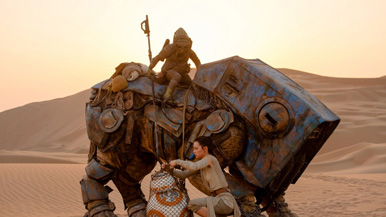|
|
Movie Review: Star Wars - The Force AwakensBy Matthew HuntleyDecember 22, 2015
In fact, Episode VII echoes Episode IV right down to the following details: a) a traditional good vs. evil plot that once again pits the insidious Galactic Empire, now operating under the banner “First Order,” against a band of Republic-backed Resistance fighters; b) a young, strong-willed protagonist who isn’t fully aware of her potential with the pervasive Force; c) a masked villain dressed head to toe in black who speaks with a deep, sinister voice; d) a scheme by the Empire to destroy its enemies with a massive, far-reaching weapon (this time, instead of the Death Star, the mechanism is simply known as “The Weapon”); e) a plan by the Resistance to destroy the Empire’s weapon with a strategic, “chain-reaction” attack; f) an open-ended conclusion that lets us know the battle for the galaxy is far from over. I can understand why the filmmakers felt the need to simply retread familiar SW tropes - after all, they wanted to win back the masses and gain new followers. But just because I understand their motivations doesn’t absolve them from criticism or being deemed flaws. This was the same problem I had with Abrams’ updated Star Trek films, which I felt merely refurbished pre-existing material instead of trying to build something new from scratch. The filmmakers err on the side of caution and that’s perhaps why The Force Awakens will ultimately be remembered as “in-the-moment” entertainment instead of evolving into something truly indelible. Sometime down the road, I can see it being thought of as “a Star Wars movie” rather than a standalone experience, unlike, say, The Empire Strikes Back, which is a masterpiece in and of itself. If the story in The Force Awakens possessed the same kind of depth, it too might have become a classic.
|

|
|
|

|
Thursday, October 31, 2024
© 2024 Box Office Prophets, a division of One Of Us, Inc.


